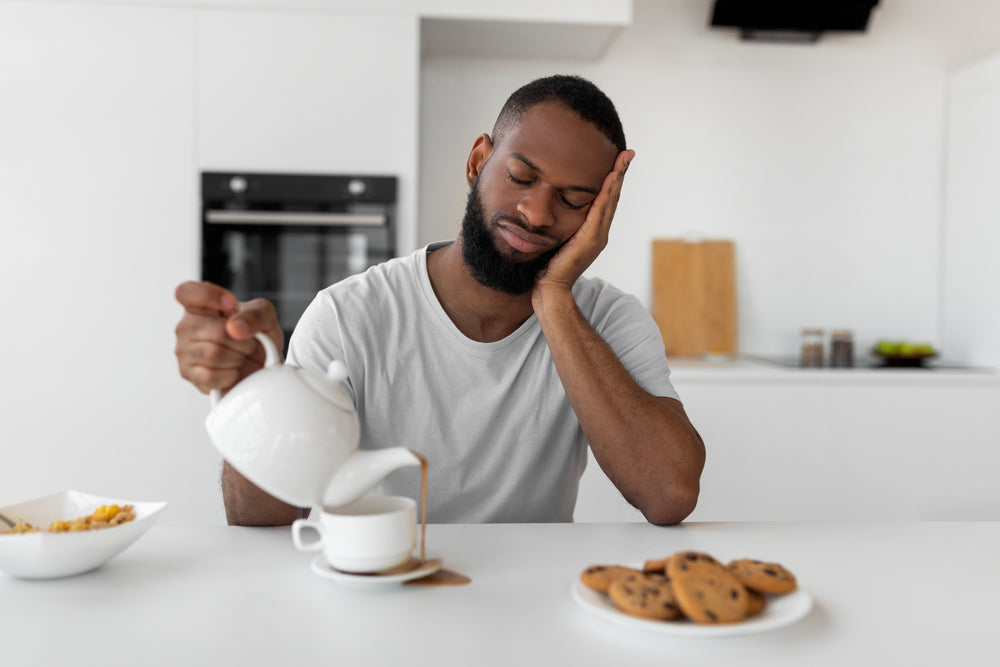Free U.S. Shipping On Orders Over $150

How To Recover From Chronic Sleep Deprivation
Posted on
An occasional night of poor sleep is normal and fairly easy to recover from. But if you are not sleeping well night after night, that turns into chronic sleep deprivation and it’s a lot harder to overcome it.
If it’s been weeks or months since you got 7-9 hours of high quality sleep, here’s a guide on how to gradually get back to a healthy sleep routine.
Why Sleep Deprivation is A Serious Problem
I am not exaggerating one bit when I say that sleep deprivation is a matter of life and death. That’s because sleep is so crucial to every aspect of our health including immunity, cardiovascular health, mental health and more.
Not getting enough sleep for a night or two is not that big a deal, though there are some unpleasant short term effects like increased anxiety, moodiness and poor memory.
But make it a habit and you are looking at some serious health and mental problems. Chronic sleep deprivation increases the risk of various health problems including cancer, dementia, type 2 diabetes, obesity, hypertension, heart disease and more.
It does this through different pathways. For example, not getting enough sleep increases inflammation in your body. Chronic inflammation is linked to cancer, arthritis, dementia, diabetes and other health issues.
Lack of sleep also increases the level of stress hormones like adrenaline and cortisol. Persistently high levels of these hormones interfere with the immune system, can cause high blood pressure and it even affects blood sugar.
Ultimately, chronic sleep deprivation is likely to cut short your lifespan. It’s not just that you experience more health problems; your body also ages and fails at a faster pace.
5 Tips to Overcome Chronic Sleep Deficiency
1. Deal With the Underlying Cause
Most of us have one major cause why we aren’t sleeping as well as we should. Some of these are under our control and easy to deal with, others are factors beyond your control.
For instance, I know my browsing habits often get in the way of sleep. For some people, it’s gaming or binge watching that’s to blame. For others, it is their work schedule. Or maybe you have insomnia caused by stress or anxiety.
Whatever it is, try to deal with it first. This may require some major life changes like moving closer to your workplace, changing jobs or starting therapy. It’s worth making these changes if it helps you sleep better.
2. Create a Healthy Sleep Routine
If your main obstacles to good sleep are your unhealthy nighttime habits, it’s time to create a better evening and sleep routine.
It’s going to be hard to change some of the habits you’ve had for years, but you don't have to do it overnight. Slowly cut back on the TV, gaming or browsing and, importantly, replace it with something more sleep friendly.
You could read a book, try some yoga or meditation, journal or whatever else helps you relax and get ready for sleep.
The goal is to build up to a routine that lets you go to sleep early and fall asleep easily.
3. Support Your Sleep With the Right Habits
Good sleep doesn't start the moment your head hits the pillow. Your daily habits play a big role in your sleep quality. Here are some habits that will help you overcome chronic sleep deprivation.
- Try to move more during the day. Even 10 minutes of brisk exercise can make a big difference in sleep quality. Movement is also a great way to tackle stress, depression and other issues that keep you awake.
- If the weather allows, spend time outside. It improves the function of your internal circadian clock, which makes it easier to sleep in the evening. Outdoor time is also a great way to reduce stress and feel more relaxed, which should help you sleep easier.
- Spend time with loved ones. If not physically, at least give them a call. A good social life is great for sleep.
- Avoid caffeine at least 6 hours before bedtime.
- Avoid alcohol in the evening. Even a glass of wine can interfere with sleep.
- Eat a light dinner early in the evening. This prevents any stomach upsets that can make it harder to sleep.
4. Create a Comfortable Sleep Environment
A sleep-friendly bedroom should be cool, quiet and dark. In addition, making it beautiful, clutter-free and relaxing can help you start sleeping a little better.
But the most important thing is a comfortable bed. Invest in a high quality mattress that provides good support, get cool and breathable sheets, buy a good pillow and so on.
5. Consider Getting Medical Help
Finally, consider talking to a doctor or sleep specialist for help improving your sleep quality. They can help you manage sleep disorders like chronic insomnia, snoring or sleep apnea.
If you have severe sleep deprivation, a doctor can also recommend sleeping aids to help you start getting back to sleeping well.
Quick links
Contact
6063 Hudson Road #160
Woodbury, MN 55125
Yo@hercLeon.com
Leave a comment: